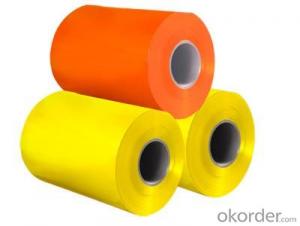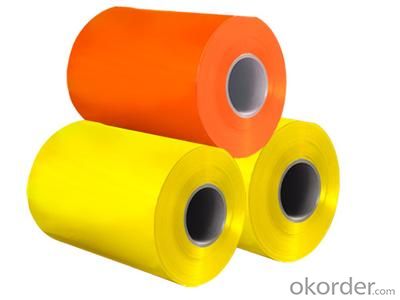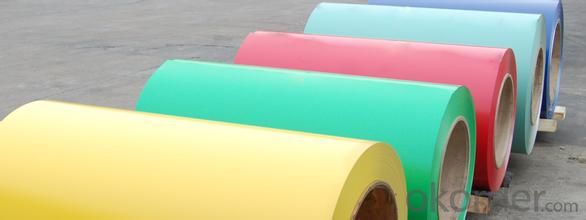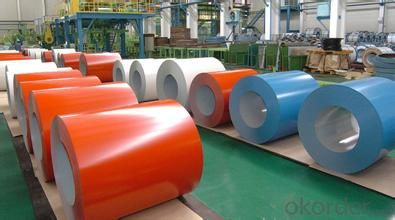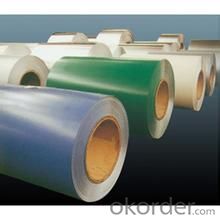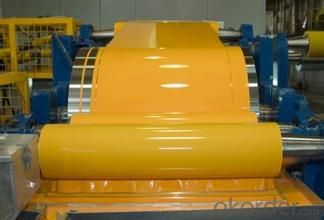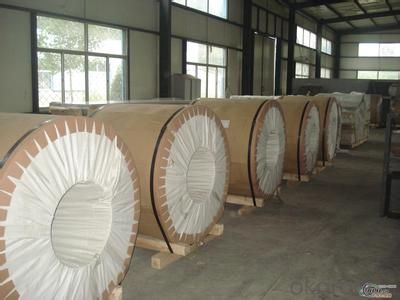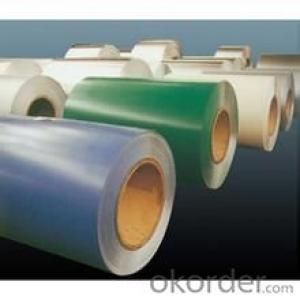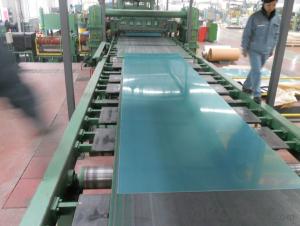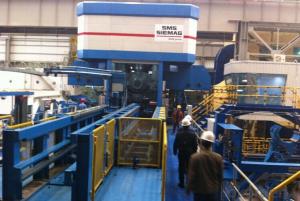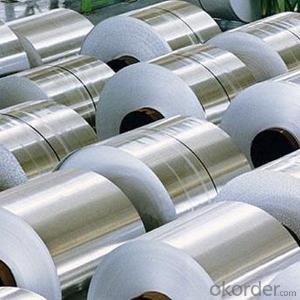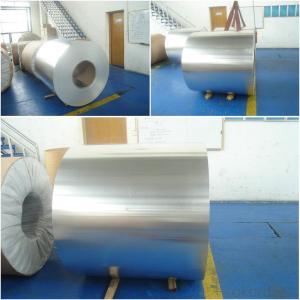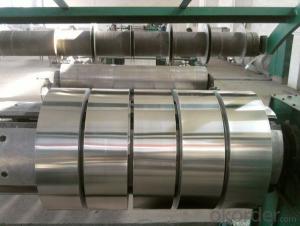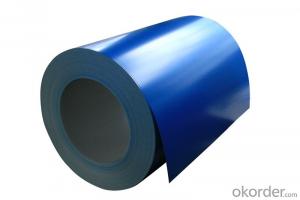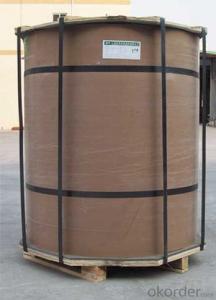Vinyl Coated Aluminum Coil Stock - Aluminum Roll Coil for Export to America
- Loading Port:
- China Main Port
- Payment Terms:
- TT OR LC
- Min Order Qty:
- -
- Supply Capability:
- -
OKorder Service Pledge
OKorder Financial Service
You Might Also Like
Aluminium is a relatively soft,durable, lightweight, ductile and malleablemetalwith appearance ranging from silvery to dull gray, depending on the surfaceroughness. It is nonmagnetic and does not easily ignite. A fresh film ofaluminium serves as a good reflector (approximately 92%) of visible light and an excellent reflector (asmuch as 98%) of medium and far infrared radiation. The yield strengthof pure aluminium is 7–11 MPa, while aluminium alloys have yield strengths ranging from200 MPa to 600 MPa. Aluminium has about one-third the density and stiffness of steel.It is easily machined, cast, drawn and extruded.
Aluminium alloys (or aluminum alloys; see spellingdifferences) are alloysin which aluminium(Al) is the predominant metal. The typical alloying elements are copper, magnesium,manganese,silicon,tin and zinc. There are twoprincipal classifications, namely casting alloys and wrought alloys, both of which are furthersubdivided into the categories heat-treatableand non-heat-treatable. About 85% of aluminium is used for wrought products,for example rolled plate, foils and extrusions.Cast aluminium alloys yield cost-effective products due to the low meltingpoint, although they generally have lower tensile strengthsthan wrought alloys. The most important cast aluminium alloy system is Al–Si,where the high levels of silicon (4.0–13%) contribute to give good castingcharacteristics. Aluminium alloys are widely used in engineering structures andcomponents where light weight or corrosion resistance is required
Alloy: AA1050, 1060, 1100, AA3003, 3005, 3015, 5052, 5754, 5083,8011,etc
Temper:H14/16/18/22/24/32,HO etc.
Thickness:0.2mm—100mm
Width:100mm—2300mm (Can be slitted)
InnerDiameter: 508MM
CoilWeight:500kg-3000kg(Max.)
Application: Foil stock, Circles, Roofing, Canstock, Marine plate,Anti-sliperypurpose in vehicles, packing and appliance.
Features:
1. Excellent quality of products
2. Quick delivery
3. Best service to clients
4. BV,SGS avalible
5. No buckle o waveness
6. Tension leveling
7. Certificate of Origin
8. Form A,E
Packaging Detail: Carton ,Wooden pallet with plastic protection packing,standard seaworthy packing or as your request.
ProductionCapacity:
AnnualProduction capacity of 600,000 tons.
Products areexported to United States, Canada, U.A.E, Brazil, Mexico,Thailand, Vietnam,Nigeria etc, over 100 countries andregions all over the world.
Coveredfactories with full production line
CNBM aluminumproduction base is comprised of 18 aluminumannealers, 10 coil and foilmills, 4 continuous production lines, 2hot rolling production line and 3prepainted lines.
FAQ:
1. What is the form of payment?
Normally 30% TT, L/C
2. Type of quotation?
FOB, CFR, CIF
3. Port of loading?
Shanghai port
4. Delivery time?
30 day after client’s deposit
- Q: What are the potential environmental impacts of aluminum coil production?
- The potential environmental impacts of aluminum coil production include deforestation due to the extraction of bauxite, water pollution from the chemicals used in the refining process, air pollution from the release of greenhouse gases during smelting, and energy consumption, as aluminum production requires a significant amount of electricity. Additionally, the disposal of waste materials and by-products can contribute to soil contamination if not managed properly.
- Q: This question asks for a comparison of the benefits and drawbacks of utilizing spring steel wire coils.
- <p>Spring steel wire coils offer several advantages such as high strength and durability, making them ideal for applications requiring resilience and resistance to deformation. They are also known for their excellent elasticity, which allows for consistent performance in dynamic applications. Additionally, spring steel wire coils can be easily formed into various shapes, providing versatility in design and functionality. However, they also have disadvantages, including potential for corrosion if not properly treated, and they can be more expensive than other types of wire due to the material's properties. Furthermore, spring steel wire coils may require specialized tools and equipment for handling and installation, adding to the cost and complexity of their use.</p>
- Q: What is the maximum length of aluminum coils?
- The maximum length of aluminum coils can vary depending on factors such as the type and thickness of the aluminum, the manufacturing process, and transportation limitations. Typically, aluminum coils can range from a few hundred feet to several thousand feet in length.
- Q: What are the potential applications of coil-coated aluminum coils?
- Coil-coated aluminum coils have a wide range of potential applications due to their versatility and durability. Some common applications include roofing and cladding for buildings, automotive parts, signage, electronics, and appliances. The coil coating process enhances the aluminum's resistance to corrosion, weathering, and fading, making it suitable for both indoor and outdoor uses. Additionally, the ability to apply various colors and finishes to the coils allows for customization and aesthetic appeal in different industries.
- Q: Can aluminum coils be painted or coated for aesthetic purposes?
- Aluminum coils have the potential to be painted or coated in order to enhance their visual appeal. The versatility of aluminum makes it a suitable material for easy painting or coating, resulting in an improved appearance. This process offers a multitude of color choices and finishes, allowing for personalization and attractiveness in numerous applications. Furthermore, the paint or coating serves as a safeguard against corrosion and weather damage, thereby prolonging the lifespan and durability of the aluminum coils. Nevertheless, it is crucial to select the appropriate paint or coating that is compatible with aluminum and appropriate for the intended purpose to achieve the best outcome.
- Q: Can aluminum coils be used in building facades?
- Yes, aluminum coils can be used in building facades. Aluminum is a popular material choice for building facades due to its numerous benefits. It is lightweight, durable, and corrosion-resistant, making it suitable for exterior applications. Aluminum coils can be formed into various shapes and sizes, allowing for creative and versatile design possibilities. Additionally, aluminum is available in a wide range of finishes, including anodized, painted, and coated, providing further customization options for building facades. Moreover, aluminum is a sustainable material as it is 100% recyclable, making it an environmentally friendly choice for construction projects. Overall, aluminum coils are a viable option for building facades, providing both aesthetic appeal and functional performance.
- Q: Hi,I am fairly new to design and have been doing technical drawing for only a few months. We have an item, that supports up to about 800KG of weight, as a C shaped channel. We are currently making this out of 3mm Mild Steel. Due to a new design, we are changing this design to avoid welding and painting the above part. This means we will be making the part from Galv sheet.I would like to make the part from Aluminium because 1) There will be no rust, 2) I think it will look better than Galv sheet but I need to keep the cost down.We use 3mm mild at the moment, because it is easier to weld than 2mm, not for strength really.Therefore, my question is, in everybody's opinion, would it be OK to make it from 2mm Aluminium, or is this likly to end in disaster?FYI, the part is 1600mm long, then on each long side there are presses of up 250mm, down 80mm and down 20mm. The weight is supported at 4 points on the 80mm flanges.What a question for my first go Answers! TIA
- Which has better songs - Number Of the Beast Which has better riffs - British Steel Which has better solos - Number of The Beast Which has better vocals - Number of the Beast Which has a cooler cover - Number of the Beast Which do You prefer - This is a real thinker, almost like Sophies Choice Metal edition. But I have owned Number and the Beast longer than I have owned British Steel. So I go with Iron Maiden Both albums get a perfect 10 because they deserve it, both have great musicianship and both have great vocals
- Q: Are aluminum coils fire-resistant?
- Aluminum coils possess fire-resistant qualities due to their high melting point of 660 degrees Celsius (1220 degrees Fahrenheit) and their inability to burn, rendering them non-combustible. This specific characteristic allows for the utilization of aluminum coils in various applications, particularly in sectors where fire resistance is of utmost importance, such as building construction, electrical wiring, and HVAC systems. Moreover, the remarkable heat conductivity of aluminum facilitates rapid heat dissipation, thereby minimizing the risk of fire incidents. Nevertheless, it is crucial to acknowledge that although aluminum coils themselves exhibit fire-resistant properties, they may be incorporated into systems alongside other components that might not share the same level of fire resistance. Consequently, it is essential to consider the entirety of the system and adhere to proper fire safety regulations and guidelines to ensure comprehensive fire safety precautions.
- Q: What are the different coil lengths available for aluminum coils?
- Aluminum coils come in a variety of lengths, depending on the specific application and requirements. Typically, these lengths range from a few feet to several hundred feet. The most commonly used coil lengths in industries like HVAC, automotive, and construction are 50 feet, 100 feet, and 250 feet. However, it is worth mentioning that custom coil lengths can also be produced to meet the customer's specific needs. These custom lengths may vary depending on factors such as coil thickness, width, and intended use. Ultimately, the available coil lengths for aluminum coils are adaptable and can be customized to meet the demands of various industries and applications.
- Q: Are aluminum coils suitable for beverage can manufacturing?
- Yes, aluminum coils are suitable for beverage can manufacturing.
Send your message to us
Vinyl Coated Aluminum Coil Stock - Aluminum Roll Coil for Export to America
- Loading Port:
- China Main Port
- Payment Terms:
- TT OR LC
- Min Order Qty:
- -
- Supply Capability:
- -
OKorder Service Pledge
OKorder Financial Service
Similar products
Hot products
Hot Searches
Related keywords
